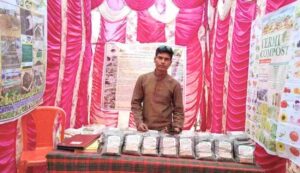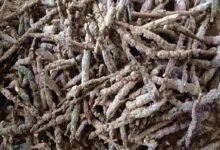Success Story: This Odisha farmer changed his fortune with organic farming, earning Rs 30 lakh annually
Success Story: Born in Jharigaon village in Odisha’s Nabarangpur District, Jitendra Maharana began his adventure with organic fertilizers under peculiar conditions. He often attributes his metamorphosis to the COVID-19 epidemic. With a little expenditure of only Rs 2,000, he had started the preparation of jiakhat some six years before, well before the epidemic peaked. At first, he only wanted to use sustainable means to support his kitchen garden. However, this little endeavor quickly led to a far more significant and exciting opportunity.

Jitendra had plenty of opportunity to experiment with organic composting methods during the lockdown. He had seen how vermicompost improved the quality and flavor of the crops he grew in addition to revitalizing his garden. He soon came to the conclusion that this approach may be expanded, not just for his own gain but also for the benefit of other farmers.
In an effort to expand his network, promote information sharing, and open up new prospects for himself and his other organic farming partners, Jitendra Maharana recently joined Krishi Jagran’s Global Farmer Business Network (GFBN).
From Tank to Terrain: Using Contemporary Technology to Scale Up
Jitendra first produced organic manure in little tanks. But when demand increased and his compost’s efficacy was acknowledged, he switched to more sophisticated techniques. He now produces jiakhat on a much greater scale using open land and contemporary composting and nutrient-enhancement methods.
Jitendra makes sure the inputs are natural and high in microbiological content by sourcing 90% of the raw ingredients for his fertilizer from nearby cow dung. He adds 10% wood chips and dry leaves into the compost to enhance its structure and aeration. This exact mix makes the manure more efficient for soil fertility by assisting in the decomposition process and guaranteeing a high-quality output.
Khushti Agro: A Dream Organic Business
As his clientele and reputation grew, Jitendra made the decision to formally establish his company. He started his own business, Khushti Agro, which is now well-known in Odisha and the neighboring states for its organic fertilizer. To accommodate farmers with diverse demands, Khushti Agro specializes in the manufacture and packing of jiakhat and sells it in weight categories of 1 kilogram, 5 kg, 30 kg, and 50 kg.
Jitendra’s trademark is distinguished by its dependability and constant quality. His fertilizers are marketed extensively in areas such as Kalahandi, Koraput, Balangir, and Nuapada. They are also sold to farmers in Chhattisgarh, which is nearby. His company has prospered as a result of this regional success, which has also assisted in promoting organic sustainability globally.
Boosting Employment in Rural Areas
Jitendra Maharana’s commitment to rural employment is among the story’s most inspirational elements. More than 15 full-time employees, many of whom were previously jobless or underemployed, now work on his farm. Jitendra has made a little but important contribution to boosting the local economy and raising living standards in his area by generating these employment possibilities.
His efforts have also attracted the attention of other nearby farmers who are eager to emulate his success by learning from his techniques. Jitendra has stepped forward to serve as a mentor and trainer in response to this increased interest. He often hosts training sessions and seminars on organic composting, where he gives helpful advice, walks through the steps of preparing jiakhat, and highlights the advantages of switching to organic.
Organic Fertilizers: An Advantage for Farming
Jiakhat and other organic fertilizers have several advantages. Organic manure improves soil structure, increases microbial activity, and retains moisture, in contrast to artificial fertilizers that may gradually deteriorate soil health. By lowering reliance on artificial inputs and organically nourishing the soil, it encourages sustainable farming.
Jitendra has personally seen how vermicomposting improves crop quality and output. Improved food flavor, texture, and shelf life have been noted by farmers who use his fertilizer. Furthermore, crops that are cultivated organically are more environmentally friendly, safer for human consumption, and devoid of dangerous chemical residues.
Local Impact and Government Push
Both state and federal governments have started a number of programs to encourage the adoption of organic farming since they understand how important it is. The goal of these programs is to lessen the negative environmental effects of traditional agricultural methods, from training sessions offered by Krishi Vigyan Kendras (KVKs) to subsidies on organic inputs.
Jitendra’s work aligns with these endeavors and supports the government’s objective. He is now a living example of how grassroots activism and policy can complement each other. Agricultural officials, researchers, and other farmers often visit his property to watch and learn from his model.
An Example for India’s Rural Communities
Jitendra’s narrative serves as a model for rural business in addition to being a personal success story. His life serves as an example of how a modest concept, motivated by passion and purpose, may grow into a long-lasting company that benefits the community as a whole as well as the person.
According to him, the real test of success is not one’s own wealth but rather the number of lives one can influence in the process. Jitendra has established himself as a role model for young farmers in Nabarangpur and abroad by educating others, generating employment, and promoting organic farming.
Plans for the Future
Jitendra wants to grow Khushti Agro’s business in the future. He intends to launch more organic goods, such as microbial soil enhancers and liquid bio-fertilizers. In order to expand his training programs and encourage more farmers to adopt organic farming, he is also looking for ways to collaborate with government agencies and agricultural colleges.
Jitendra Maharana is a bright example of rural innovation, sustainable agriculture, and community empowerment because of his incredible journey from a humble beginning with only Rs 2,000 to earning Rs 30 lakh yearly. He has transformed organic fertilizer from a backyard hobby into a successful company that employs hundreds of farmers and provides education to dozens of families via Khushti Agro.
Stories like Jitendra’s serve as a reminder that, while the agricultural industry looks for more environmentally friendly and sustainable methods, returning to nature and pursuing it with purpose and success is what farming’s future holds.
Note: To exchange information and experiences and grow their enterprises, agricultural experts, farmer entrepreneurs, innovators, buyers, investors, and policymakers come together on the Global Farmer Business Network (GFBN), a dynamic platform. Through shared knowledge, GFBN, led by Krishi Jagran, promotes meaningful relationships and cooperative learning opportunities that propel sustainable development and agricultural innovation. Become a member of GFBN now: Gfbn via https://millionairefarmer.in

